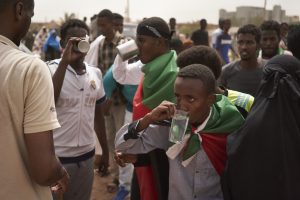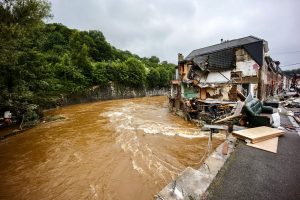Climate change and mass violence – the lethal connection
Climate change is having an enormous impact on our world, changing it profoundly. The connection to mass violence and atrocities produces some of its most dangerous effects. Detmer Kremer, Policy and Communications Coordinator at Protection Approaches, visited us at the Holocaust Memorial Day Trust recently. He shared learnings from Protection Approaches’ work exploring the impact of climate change on identity-based violence, and gave advice on what we can all do to help prevent it.

Image: Nearly one-third of Pakistan was deeply affected by flooding in 2022. The floods left millions of people dispossessed of land and lacking food, water or work © Getty Images / Stringer
Protection Approaches believes that a changing environment will transform every aspect of how we live our lives but it is in the areas of identity-based violence, systemic racism, extremism, mass atrocity, and armed conflict that we will likely see the most explosive human consequences.
This blog post looks at some of what we discussed during Detmer’s visit.
The effects of climate change
Climate change is a natural process, but human interference is making these changes more rapid, extreme, and unpredictable. Generally when we talk about climate change and the climate emergency, we are referring to the changes caused by human interference such as our increasing emissions which get trapped in the atmosphere, causing a warming greenhouse effect. While there is still time to act, certain consequences of climate change are irreversible.
Although the world is warming overall, the impact of this looks very different in different parts of the world. The Arctic is warming four times faster than the rest of the world, whereas other areas are experiencing extreme cold weather. One of the key things that we are seeing, including in the UK, is more frequent, severe, and unpredictable weather events such as cyclones and hurricanes, heatwaves, and droughts.
Another crisis, made worse by climate change, is a reduction in biodiversity (the variety of life on earth). According to one report, up to one million species are at risk of extinction, with climate change being one of the causes of this. We are dependent on biodiversity, which provides us with food, water, medicine, economic growth and much more.
The history of environmental change and mass violence
The history of the connection between environment, climate and mass violence is long. Detmer gave one example which illustrates this really well: buffalo were integral to the culture, spirituality and survival of Indigenous people in North America. Buffalo meat provided food, their skins were made into tents, and their migration patterns determined different political alliances between communities. In the mid-19th century, white settlers launched a campaign to destroy the buffalo in order to solve what they called the ‘Indian problem’. By the end of the 19th Century, the buffalo population had gone down from 30 million to only 100. Although this was not the only tactic used to destroy Indigenous peoples in North America, it had a devastating human and environmental impact, with many Indigenous people starving and others becoming dependent on settlers for food.

Protesters in Sudan, June 2019 © David Degner / Getty
This example illustrates how climate and environment have been used as a tool of destruction and violence throughout history – and today is no different. Working with Waging Peace, Sudanese activist Liela M. Medani reported how the Sudanese government used electricity outages during a climate change exacerbated heat wave to further suppress opposition to the military junta; the outages meant protesters were unable to rinse themselves with cold water or cool off after being tear-gassed.
Detmer explained how in these situations, perpetrators of mass violence intentionally use and take advantage of changes to the environment as a weapon.
The impact of climate change on mass violence and atrocities
The consequences of climate change are fuelling the risks that can make mass violence more likely; they are a factor in many of the atrocities happening around the world today. There are four effects that act as important drivers for this:
Resource scarcity
Climate change can make resources more scarce – less arable land, less drinking water, and sometimes literally less land to live on. This can create tensions between communities. It often puts a particular burden on those who are already marginalised, for example, violence towards certain ethnic groups or further exclusion from access to limited resources for disabled people or women.
Resource surplus
In contrast, climate change can also create a sudden abundance of certain resources. As Detmer explained, previously frozen and unpassable trading routes through the Arctic have now opened up which has consequences for the Indigenous communities who live there.
Human movement
People around the world are being forced to leave their homes and sometimes their country of origin, due to the effects of climate change. This could be due to sudden events like the floods in

Flooding damage in Belgium, July 2021 © Olivier Matthys / Getty
Pakistan, or slow onset events, as in Burkina Faso where people are looking for economic opportunities elsewhere due to a reduction in arable land. As the floods displacing thousands in Germany, Belgium and the Netherlands in 2021 showed, having to move because of the consequences of climate change can happen anywhere. It is important to note that this does not affect people equally. Some people, and again especially those already marginalised, are unable to leave due to factors like disability or poverty.
We can see ourselves in the UK, how human movement can cause rising tensions; the demonization of people who have been forced to move due to climate change can cause a rise in identity-based violence. All of us – from politicians to journalists to shopkeepers and teachers – must be careful about how we talk about people on the move and make efforts to welcome them.
How we respond to climate change
Surprisingly, it is sometimes our response to the climate emergency which can cause further problems. An example of this is the increase in electric car production. Electric cars require lithium, much of which is mined irresponsibly in the eastern Democratic Republic of the Congo. This causes tremendous environmental destruction and pollution as well as fuelling armed groups currently conducting campaigns of mass violence in eastern DRC.
Detmer emphasised that this does not mean that we should stop making electric cars, but that consideration needs to be given to the far-reaching effects of any response to the climate emergency. We could, for example, use atrocity and conflict-sensitive approaches to electrifying transport and focus on electrifying public transport that everyone can afford.
What can we do?
Climate change can be frightening and adding the potential risks of mass violence could make it overwhelming. However, Detmer is optimistic that we can all make a difference:
Education and activism
Climate change and human rights are inextricably connected. Therefore, when we campaign for, teach about, or raise awareness of either of these causes, we should be talking about both. For example, teaching about climate change in a school should encompass a discussion on how local, and indeed worldwide, populations’ rights are impacted.
Organisational policies
Find out whether the company or organisation you work for has an environmental policy, and if not, ask them to consider how they can become more environmentally friendly. If you are the leader of an organisation, ensure you have an environmental policy in place. For example, consider how you source your furniture, printing and catering – are you using ethical suppliers? Do you have a cycle scheme available to employees? How are your pension funds invested? If your industry requires a lot of travel, consider offsetting these emissions by investing in a human rights centred, offsetting project. Aim to find a way of working that is in harmony with the planet.
Raising awareness
A recent report from the International Development Committee – a cross-party parliamentary group that scrutinises Government policy – found that, especially considering the risks from climate change, the UK must do more to be prepared. The report, and the UK Atrocity Prevention Working Group, which Protection Approaches convenes and we are a member of, are calling for a national strategy of Atrocity Prevention that centres on people and environment.
Despite reports like this, the link between climate change and mass violence and atrocities is not widely known. Help to raise awareness of this by sharing this blog and talking about this subject with your friends and family, and online.
We hope to continue to raise awareness of this subject online, so make sure to follow us on Twitter, Instagram and Facebook. And sign up to our newsletter here.
Protection Approaches works to change how the world views identity-based violence – and by so doing, change the way we respond to and prevent it. This includes working at the forefront of emerging or overlooked prevention priorities, such as the links between the climate emergency and mass atrocity risks. Visit their website or follow them on Twitter to find out more and support their work.
Support for climate anxiety
This subject matter can be overwhelming and frightening. For tips on taking care of yourself when experiencing climate anxiety please visit the Climate Action website.
Further reading
- The Intergovernmental Panel on Climate Change (IPCC) prepares comprehensive Assessment Reports about the state of scientific, technical and socio-economic knowledge on climate change, its impacts and future risks, and options for reducing the rate at which climate change is taking place. All their recent reports have a summary for policymakers, which are shorter, more accessible publications outlining what the science is and how it impacts our planet.
- Protection Approaches works across government and civil society towards an inclusive and future-proof National Strategy on Atrocity Prevention and to strengthen UK contributions to the prevention of mass violence. Read their statement on COP26 here.
- UK Parliament report warns climate change likely to worsen atrocities
- People’s climate empowerment series – written to empower people to take action, this series offers a set of tools to explain how international law can help us support fair, ambitious and inclusive action to help protect people and nature, in efforts to stabilize climate change.


